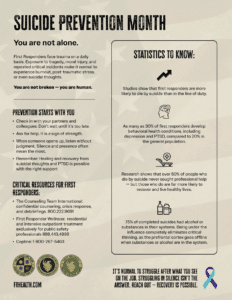By Stephen Odom, PhD and Chris Catren, Ret. Chief of Police
Leadership must set an example of prioritizing their family, which will ultimately impact families department wide and communities across the nation.
One of the greatest challenges First Responders face is keeping their families whole and healthy throughout their career. Because of the critical nature of their role, they are exposed to traumatic situations. Unfortunately, the consistent trauma exposure can lead to stress, anxiety, post-traumatic stress, depression, substance abuse, and suicidal ideation.
It is essential to recognize how the family unit is affected so that leadership can safeguard the wellness of the home. Families deal with significantly higher rates of alcohol misuse compared to the general population. They face a unique set of life circumstances that can make it challenging to relate to others that are not in public safety.
“Your family didn’t sign up for this – you did,” said Chris Catren, retired Chief of Police for Redlands, California. He explains that a public safety career isn’t easy – for anyone involved. “It’s an awesome responsibility, but you need to take your family into consideration and show them they are cared for and explain to them why this job can take so much.”
Outside of the effects of trauma, First Responders and their families often face disrupted routines, lack of communication, anger, social isolation, and missed expectations. These challenges can weigh heavily on partners, spouses, and children – as they often deal with secondary traumatic stress.
However, when the family is healthy, the workplace can also become a more efficient and effective environment. Adopting this basic blueprint is a great beginning for family health:
Open Communication
Encourage open and honest communication within the family and create a safe space for everyone to ask questions, express their feelings, and share their concerns.
Establish Routine
Consistent routines and schedules provide children with a sense of stability and predictability, even amid the unpredictable nature of a First Responder‘s work schedule.
Provide Education
Educate your children on their parent’s job and help them understand the importance of their work in serving the community. Give them age-appropriate information and coping strategies for managing any stress and anxiety they may experience.
Seek Support
Encourage family members to seek support from each other, as well as from support groups, counseling services, and community organizations. Don’t let them go at it alone.
Self-Care for Parents
Recognize the importance of self-care for First Responders and encourage significant others to prioritize their own mental, emotional, and physical well-being. By taking care of themselves, parents can better support their children’s needs and navigate the challenges of their demanding profession.
It is essential for leadership to also prioritize their own family, not only for the sake of their spouse and children, but also for their employees. There are no secrets in the department – and leaders must set an example of putting their family first.
“You have to live it,” Chief Catren said. “It’s a disciplined approach to making sure it’s not only something you’re saying is good for your employees, but something you’re demonstrating as well. You have to make it a habit.”
Be proactive in prioritizing your family, don’t let them fall to the wayside or be left picking up what’s left in the future. “There’s additional pressure for leaders. You’re bringing everything home,” Chief Catren explained. “Make your family a priority. When the phone rings, you need to answer, that’s a part of the job. But when you can change it, change it.”
Take the lead to create programs that begin at the academy level and continue through retirement to provide resources that will benefit both First Responders and their families. They can host events to build family engagement or provide education through certified training courses to give their employees tools they need to work towards a healthy home life. With the wellness of families on the line, leadership must be proactive on this issue.




